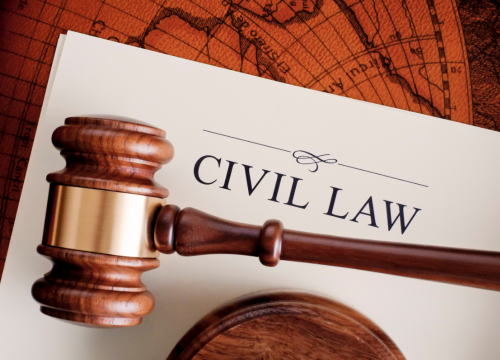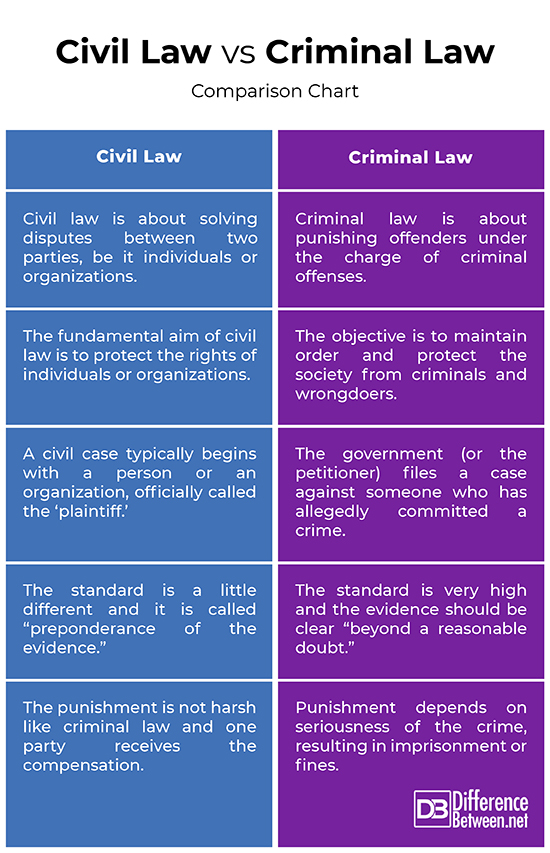Difference Between Civil and Criminal Law
Understanding the differences between civil and criminal law is one of the foundational subjects that you need to know because they are two very different and broad entities of law with very different sets of laws, procedures, regulations, and punishments. The criminal court system is very distinct from the civil court system where your business related cases happen. Sometimes, it gets confusing because the two might overlap wherein some case gets to criminal court and then it also happens in a civil court. So, let’s get into the major differences between the two legal systems.

Civil Law
Civil law is anything that is not criminal in nature. It basically is the body of law that deals with behavior that constitutes a personal injury to a person or other private party, such as an entity or organization. Civil law defines the rights of individuals, private organizations, government, or non-government entities. Divorce, personal injury, breach of contract, and a whole host of business and personal transactions come under the civil law proceedings.

Criminal Law
Criminal law is the body of law concerned with the punishment of offenders who commits crimes. It is the system of law that applies to criminal acts like murder, robbery, theft, DUI, arson, etc. It is related to things that the government will want to throw you in jail or fine you for doing. Criminal law is the system of law that defines offenders either as guilty or not guilty.
Difference between Civil and Criminal Law
- Nomenclature – Civil law is all about solving disputes between two parties, be it individuals or organizations, in regards to money, property, housing, divorce, or so on, rather than criminal or religious affairs. Criminal law, on the other hand, is about punishing offenders under the charge of criminal offenses, ranging from crimes like robbery and assault to serious crimes like murder, rape, and arson. When we talk about criminal, we talk about guilt meaning someone is guilty of a crime. In civil law, no one can ever be guilty of a business lawsuit; they are always liable.
- Objective – Civil cases are about somebody against somebody else or an organization against some other organization. The fundamental objective of civil law is to protect the rights of individuals or organizations, making sure disputes between the two parties do not escalate into a violent confrontation. The objective of criminal law, on the other hand, is to maintain order and protect the society from criminals and wrongdoers, and punishing the serious offenders.
- Plaintiff/Petitioner – Civil law deals with cases that are non-criminal in nature, typically in settling property or money related disputes between two individuals or organizations. A civil case typically begins with a person or an organization, officially called the ‘plaintiff,’ over some dispute with some other person or organization. In criminal law, the government (or the petitioner) files a case against someone who has allegedly committed a crime.
- Evidence – Another key distinction point between the two is the kind of evidence required to get guilt or reliability. Evidence is crucial in both civil and criminal proceedings and it may include oral and documentary evidence. The standards are very high on the criminal side because you want to be 100% certain that he or she has committed the crime. Evidence should be clear “beyond a reasonable doubt”. On the civil side, the standard is a little different and it is called “preponderance of the evidence.”
Civil Law vs. Criminal Law: Comparison Chart

Summary
In simple terms, criminal law says someone is either guilty or not guilty whereas civil law says someone is either liable or not liable. We are not suppose to use the terms interchangeably because one is business law and the other, as the name suggests, is criminal in nature. The criminal court system is completely different from the civil court system. A civil case typically begins with a person or an organization, officially called the ‘plaintiff.’ In criminal law, the government files a case against someone who is accused of committing a crime.
What are 3 differences between civil and criminal cases?
Civil cases are filed by a plaintiff whereas criminal cases are filed by the government (also called the petitioner); civil cases deal with disputes between individuals or organizations whereas criminal cases deal with criminals and serious offenders; and civil cases are not supposed to be unanimous whereas criminal cases need to be unanimous.
What is the difference between criminal law and civil law 5 points?
The five distinction points between civil law and criminal are: burden of proof, type of punishment, evidence, objective, and petition.
What are the similarities between criminal and civil law?
The decision of the court can be appealed in both civil and criminal cases. Also, the victim in both the cases can be an individual or an entity like an organization.
What is the relationship between criminal law and civil law?
Civil and criminal law differ with respect to the nature of the crime and the way cases are initiated, how cases are handled by a judge or jury members, and so on. Also, the punishment is very different in both the cases.
- Difference Between Serif and Sans Serif - April 22, 2024
- Difference Between HTML and Text - April 19, 2024
- Difference Between FTP and SFTP - April 16, 2024
Search DifferenceBetween.net :
 Email This Post
: If you like this article or our site. Please spread the word. Share it with your friends/family.
Email This Post
: If you like this article or our site. Please spread the word. Share it with your friends/family.
2 Comments
Leave a Response
References :
[0]Farmer, Lindsay. Making the Modern Criminal Law: Criminalization and Civil Order. Oxford, UK: Oxford University Press, 2016. Print
[1]Rakoff, Jed S. and Howard W. Goldstein. Rico: Civil and Criminal Law and Strategy. New York, United States: Law Journal Press, 2022. Print
[2]Image credit: https://www.canva.com/photos/MAEFgokDPkU-criminal-law/
[3]Image credit: https://www.canva.com/photos/MAED-CiIdyc-civil-law/


It’s very helpful for me
thank you for definition it is appreciated